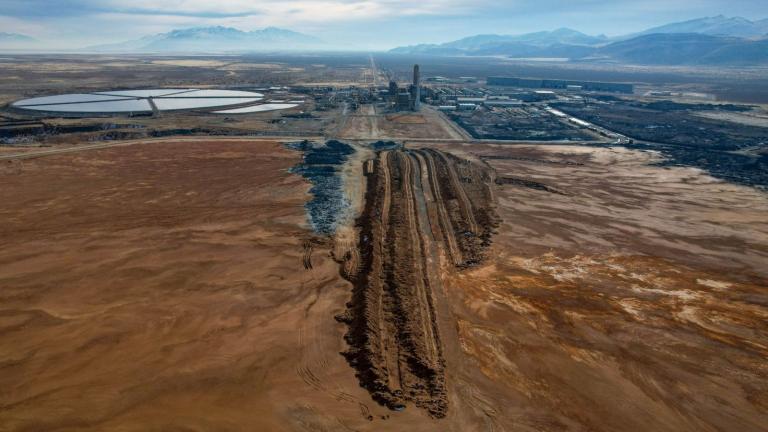 The writing’s on the wall.Cross-posted from the Natural Resources Defense Council.
The writing’s on the wall.Cross-posted from the Natural Resources Defense Council.
In fall 2007, newly-appointed Sen. John Barrasso (R-Wyo.) spoke to a Wyoming summit on energy and climate. Barrasso said:
I had an old medical professor, Dr. Milt Davis. He said “you never want to be diagnosed with mural dyslexia.” I asked him what he meant. He said “mural dyslexia is the inability to read the handwriting on the wall.”
Barrasso continued: “You can harbor doubts about the science, but the political and market realities are under no such illusion — the writing is on the wall.” He said: “Washington is pathetically behind and lagging on a coherent energy picture … And states, private industry, and public institutes are forced to work around the irresponsible absence of action on a federal energy policy.” And Barrasso added this:
The energy debate of our generation is carbon. Period. You can agree or disagree with Global Warming theories, but no one can wish the issue away. And the public policy debate about carbon has dramatic effects on Wyoming ‘s future — our state, our communities, our jobs, our families. Period.
Barrasso’s was a promising start. But it didn’t last. Barrasso moved quickly from “carbon free” to “free carbon.” In 2010, the man who had seen the writing on the wall became part of the wall. Barrasso fell into lockstep behind Sen. Mitch McConnell (R-Ky.) and helped kill last year’s climate and energy legislation.
Now there’s an epidemic of mural dyslexia. Some 123 members of the House of Representatives have cosponsored bills that, as my colleague Pete Altman writes, choose polluters over children’s health. These “bad air bills” would stop EPA from doing its job to protect our health from life-threatening air pollution — three by blocking any safeguards against carbon dioxide and the other pollutants that drive dangerous global warming, and a fourth by blocking needed cuts in toxic mercury, soot, and smog pollution.
These bills are just warm-up acts. In recent weeks, Rep. Fred Upton (R-Mich.), chair of the House Energy and Commerce Committee, has gone out of his way to partner with Sen. James Inhofe (R-Okla.), ranking member of the Senate Environment and Public Works Committee, whose screeds against the climate change “hoax” used to make even members of his own party wince. ClimateWire reports that Upton and Inhofe will soon unveil a bill to “strip EPA of its authority to limit carbon emissions from power plants, refineries, and other stationary sources.” In their own words, Inhofe and Upton issued this statement, together with Rep. Ed Whitfield (R-Ky.), chair of the Energy and Commerce subcommittee with jurisdiction over the Clean Air Act: “[I]n the coming weeks, we will outline a path forward to permanently eliminate the threat of greenhouse gas regulation through the Clean Air Act.”
According to The Hill, Whitfield suggested the bill will come in late February or early March and “will be a broad indictment of the EPA’s policies. It will touch on the EPA’s air transport rules, its new source review requirements, and its plans to impose new greenhouse gas standards large facilities.”
For good measure, Inhofe will join Barrasso to introduce, as early as today, “a much broader bill that would bar the federal government from regulating greenhouse gas emissions under any existing environmental law.” Carbon pollution would be exempt not only from the Clean Air Act, but also from laws to assess environmental impacts, protect endangered species, or save energy and reduce our oil dependence. The bill may also seek to preempt states from acting within their own borders and to prevent state and federal courts from giving any justice or redress to victims of carbon pollution harms. “I think you’ll find the Republicans are pretty lock step in this,” Inhofe said.
At the same time, Sen. Lisa Murkowski (R-Alaska) is negotiating with Sen. Jay Rockefeller (D-W.Va.) to broaden his bill [$ub req], which thus far would ban EPA carbon safeguards for two years. She wants to erase the modest measure that took effect this month, calling on the biggest new power plants and factories to install available and affordable carbon controls.
All these bills are based on a pair of big lies. The first is that EPA is engaged in an “unconstitutional power grab” trying “to regulate that which it has been unable to legislate.” No, EPA is doing its job under the Clean Air Act, a law enacted by Congress, which (as the Supreme Court has found) directs EPA to act when science demonstrates that pollutants endanger our health and welfare. The second big lie is that EPA’s modest plan for curbing dangerous carbon pollution “will kill millions of jobs” and “poses a significant threat to job creation and economic recovery.” But EPA is not allowed to make businesses take steps that are too costly or that would hurt the economy — Clean Air Act safeguards have to be both achievable and affordable. And despite cranked-up prophecies of doom — rightly rejected as unproved by the federal courts of appeals — the economy did not collapse when these measures went into effect on Jan. 2.
Some of these bills may be just theater, intending by hyperbole to make something like Rockefeller’s two-year delay, or a year-by-year funding rider, look good by comparison. But in substance, these supposed short-term delays are no different, and no better, than the Upton-Inhofe-Whitfield “permanent” ban. One-year funding riders, and two-year delays like Rockefeller’s, are like letting roaches into your house — once they get into legislation it’s very hard to get them out. A one-year rider blocking new fuel economy standards was robotically extended five times, contributing (as my colleague Dan Lashof has noted) to the conditions tha
t bankrupted two of our car makers when gas prices rose and all they had to peddle was gas guzzlers.
Rockefeller says [$ub req] he wants neither a one-year delay nor a permanent ban: “What worries me,” he said, is that we’ll “get a bill which abolishes EPA, strips them of all funding, and I’m not for that.” Rockefeller used to say that a two-year delay would give Congress time to complete work on comprehensive climate legislation, but everyone knows that’s not happening in this Congress. So now he says his two year delay is just the right amount of time to allow the development of carbon capture and storage technology (CCS). But as Lashof observed, the main effect of a two-year delay:
would be to stifle the private sector investment essential to commercializing this technology. The climate legislation passed by the House in the last Congress would have accomplished the goals Senator Rockefeller has endorsed, including providing very generous support for deploying CCS technology. But the Senate didn’t even bring the bill up for a vote, in part because of Rockefeller’s objections. The likelihood is that two years from now Senator Rockefeller will still be arguing we need more time for the development of CCS.
As Rep. Henry Waxman (D-Calif.), ranking member and former chairman of the Energy and Commerce Committee, underlined at a hearing last week, blind opposition to EPA’s doing its job under the Clean Air Act actually hurts American businesses and hurts our economic recovery:
We need to remember that federal regulations also play a vital role in growing our economy and protecting our health and environment. …
Members who were on this Committee last Congress may remember our first hearing. Like today’s hearing, our focus two years ago was on how to build a strong economic future for our country. We invited nine CEOs from our nation’s leading manufacturing and energy companies to testify.
And what they told us was that they needed Congress to pass comprehensive energy legislation so they could plan and invest for the future. They told us that sensible, market-based regulation of carbon emissions would spur billions of dollars in new investments.
Here is what Jim Rogers, the CEO of Duke Energy, told us: “It is critical we know the rules of the road of climate change as soon as possible to make sure that we are making the right investments. Regulatory uncertainty is postponing investments and … it’s postponing the creation of jobs from apprentices to engineers to Ph.Ds.”
Jeffrey Immelt, Chairman and CEO of General Electric, was asked last week to lead the President’s Council on Jobs and Competitiveness. He told us the same thing: “Certainty in the investment world is critical to success. And what we lack today is certainty. … I am a capitalist, pure, plain, and simple. And I just think the system we have today is untenable over the long term insofar as … the science is so compelling on global warming.”
What these CEOS were telling us is that they needed more energy and carbon regulation — not less — so they would know the rules and plan and invest for the future.
They understood what Alan Greenspan forgot: regulation is often needed to promote jobs and economic prosperity.
As Dan Balz wrote in the Washington Post yesterday, there are clear signs already that the House Republicans are running far to the right of public opinion: “The two pillars of the Republican response to Obama’s speech — the record deficits and a warning that the size and scope of government threaten economic prosperity and individual freedom — fell farther down the list of worries in the NBC-Wall Street Journal survey. A fifth of respondents cited the deficit, and only 14 percent named the role of government.”
By contrast, in a poll conducted this fall for NRDC, Opinion Research Corp/Infogroup found that 82 percent of Americans support the work of the EPA. And 73 percent support “protecting the Environmental Protection Agency’s authority” to “take steps that will reduce greenhouse gas emissions from electric utilities and other major industrial polluters.”
The Republicans overreached in the Gingrich Congress, when they misgauged the depth of public support for protecting health and curbing dangerous pollution. Will they overreach again?
The handwriting is still on the wall.




